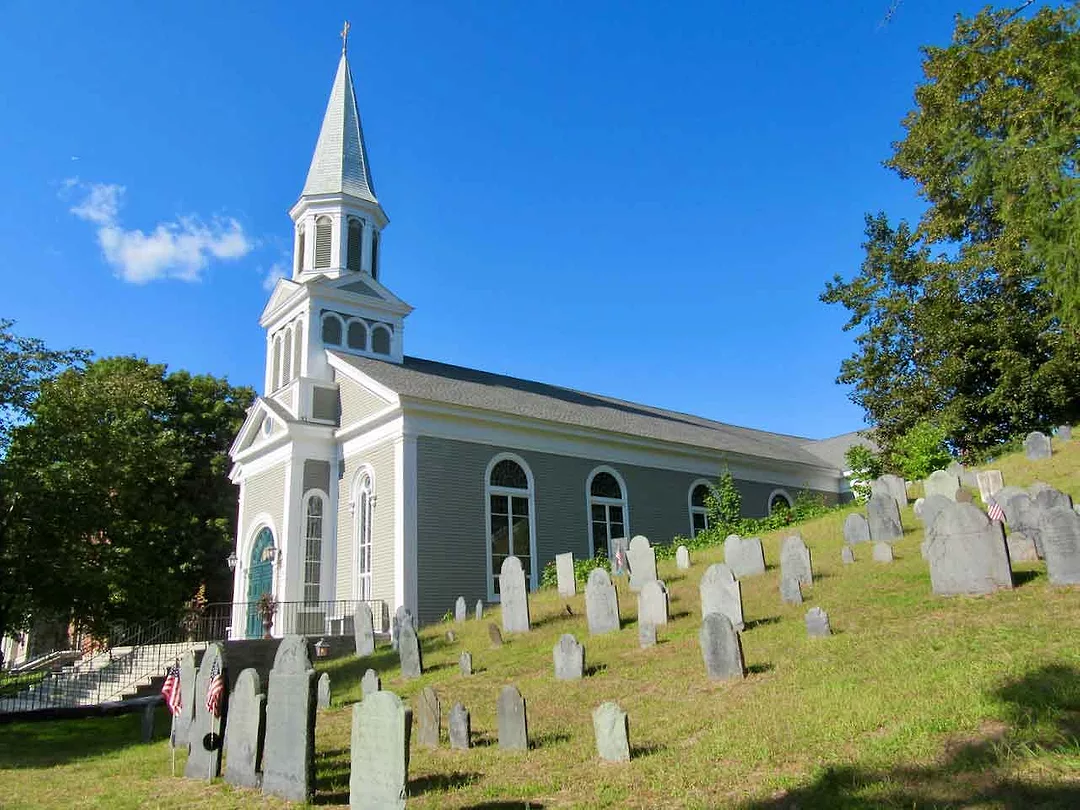QUESTIONS
1. You live in Concord, MA, in 1773 and, as required by law, are part of the militia. You report for training four times a year and, each time, find yourself surrounded by people of what ages?
A. 17-28
B. 17-42
C. 16-60
D.
12-50
Click to show the answer
A. 17-28
B. 17-42
C. 16-60
D. 12-50
Answer: C. 16 - 60. A year after Concord was founded in 1635, the General Court of Massachusetts Bay Colony met on December 13, 1636, and ordered the organization of a militia in the Colony. With some exceptions, men aged 16-60 were required to serve.
2. Select all that apply. Like the person in the question above, you also live in Concord in 1773, but you are exempt from militia service because you are a:
A.
Farmer
B.
Woman
C. Minister
D. Quaker
Click to show the answer
A. Farmer
B. Woman
C. Minister
D. Quaker
Answer: B (Woman) or C (Minister). Only men were required to serve in the militia, and ministers were exempt. If you guessed Quaker, you earned partial credit. Despite their commitment to pacifism, Quakers were not exempt from early Massachusetts militia service and had a mixed history of service, risking punishment in their own communities if they did serve and punishment from the General Court if they did not. In 1757-58, the Massachusetts General Court updated the Province Laws, replacing fines on dissenting Quakers with a tax to fund replacement soldiers. [Province Laws, 1757-58, Ch. 0036]. Following the April 19, 1775, battles of Lexington and Concord, some Massachusetts Quakers were moved to join the newly-formed Continental Army. In 1800, the Massachusetts Legislature updated Militia Law to exempt Quakers from military service.
3. Following the December 16, 1773, Boston Tea Party, the British Parliament passed the Coercive Acts of 1774. Also known as “the Intolerable Acts,” the acts consisted of four laws imposed upon the colonists. Which of the below was not one of these acts?
A.
The Massachusetts Government Act
B. The Boston Port Act
C.
The Tariff and Tea Act
D. The Quartering Act
E. The Administration of Justice Act
Click to show the answer
B. The Boston Port Act
C. The Tariff and Tea Act
D. The Quartering Act
E. The Administration of Justice Act
Answer: C. The Tariff and Tea Act is fictional and not one of the Intolerable Acts passed by Parliament
4. You live in Concord in 1773. There is an empty barn on your property and your recently deceased friend’s house is sitting empty across the field from yours. Following the passage of Parliament’s Coercive Acts, you are most concerned about which of the four new acts that have been passed into law? (See question 3 for options)
Click to show the answer
Answer: D. The Quartering Act. The act stated that if no barracks were available, “any officers or soldiers in His Majesty’s service…without quarters [may, by order of the governor of the province, be housed in] uninhabited houses, outhouses, barns, or other buildings as necessary to be taken…for such time as [the Governor] shall think proper.” (Condensed and adapted from the original)
5. In the fall of 1774, who was the governor of the Province of Massachusetts Bay?
A. General Thomas Gage
B.
John Hancock
C.
Thomas Hutchinson
D.
William Phips
Click to show the answer
A. General Thomas Gage
B. John Hancock
C. Thomas Hutchinson
D. William Phips
Answer: A. General Thomas Gage. Gage succeeded Governor Thomas Hutchinson, who had been governor from March 1771 through May 1774. Following the December 1773 Boston Tea Party, the British royal government lost faith in Hutchinson’s ability to control the Province of Massachusetts and replaced him with military officer General Thomas Gage.
6. True or False: On April 19, 1775, Paul Revere rode into Concord, alerting residents that the King’s troops were on the march to Concord to confiscate weapons the colonists had been stashing to support a continental army.
Click to show the answer
Answer: False. Starting his midnight ride in Boston, Revere intended to arrive in Concord but was captured by a British patrol in Lincoln (the town next to Concord). Concord doctor Samuel Prescott, who had joined Revere in Lexington, escaped capture and carried Revere’s message into Concord.
7. You are a Concord minuteman. Before dawn, you are milking the cows when you hear the meeting house bell ringing and a methodic firing of gunshots. This is a prearranged signal that you should:
A.
Lock down your house and remain indoors
B.
Put on your uniform and wait in front of your house for your company to march
C.
Grab your gear and make haste to a prearranged muster point
D.
Meet your friends for a wee dram in the Wright Tavern
Click to show the answer
A. Lock down your house and remain indoors
B. Put on your uniform and wait in front of your house for your company to march
C. Grab your gear and make haste to a prearranged muster point
D. Meet your friends for a wee dram in the Wright Tavern
Answer: C. Grab your gear and make haste to a prearranged muster point. Something is about to happen!
8. During the American Revolutionary War, the King’s troops wore red uniform coats. The color inspired many nicknames and myths. What is the most likely reason their jackets were red?
A.
They could see each other better in the fog.
B.
The red camouflaged blood stains.
C.
The red dye was cheap and proven to hold fast when wet.
D.
The brightly dyed color represented fiery resolve.
Click to show the answer
A. They could see each other better in the fog.
B. The red camouflaged blood stains.
C. The red dye was cheap and proven to hold fast when wet.
D. The brightly dyed color represented fiery resolve.
Answer: C. The red dye was cheap and proven to hold fast when wet.
9. In 1775, if you were in Concord, Massachusetts, and saw a Revolutionary War officer (British, colonist, or French) wearing a crescent-shaped metal or leather piece over his clothing and around his neck, you would know he was:
A. A gentleman by birth
B.
On leave
C.
On duty
D.
A dandy
E.
A secret Son of Liberty
Click to show the answer
A. A gentleman by birth
B. On leave
C. On duty
D. A dandy
E. A secret Son of Liberty
Answer: C. On duty. Named after the French word for throat (gorge), gorgets were decorative pieces worn around the necks of commissioned officers when they were on duty. The gorget might be engraved with regimental affiliations, coats of arms, or other designs meaningful to the wearer.
10. True or False: The April 19, 1775, battle at Concord’s North Bridge was fought between the British and the American Continental Armies.
Click to show the answer
Answer: False. The colonists who faced the British Army on April 19, 1775, were militia members. The Continental Army was officially established about two months later, on June 14, 1775.
Contact Barrow Bookstore for a list of sources. Barrowbookstore@gmail.com.
————————————————————————
For more than 50 years, Barrow Bookstore has been a favorite of residents and visitors alike, specializing in Concord authors and history, children’s books and literature. The shop also provides a wide array of gently read and rare titles ranging from paperbacks to first editions and original manuscripts. Staff members have all worked as tour guides and reenactors in Concord and are happy to share their knowledge about the town and its history. Discover more at barrowbookstore.com.


